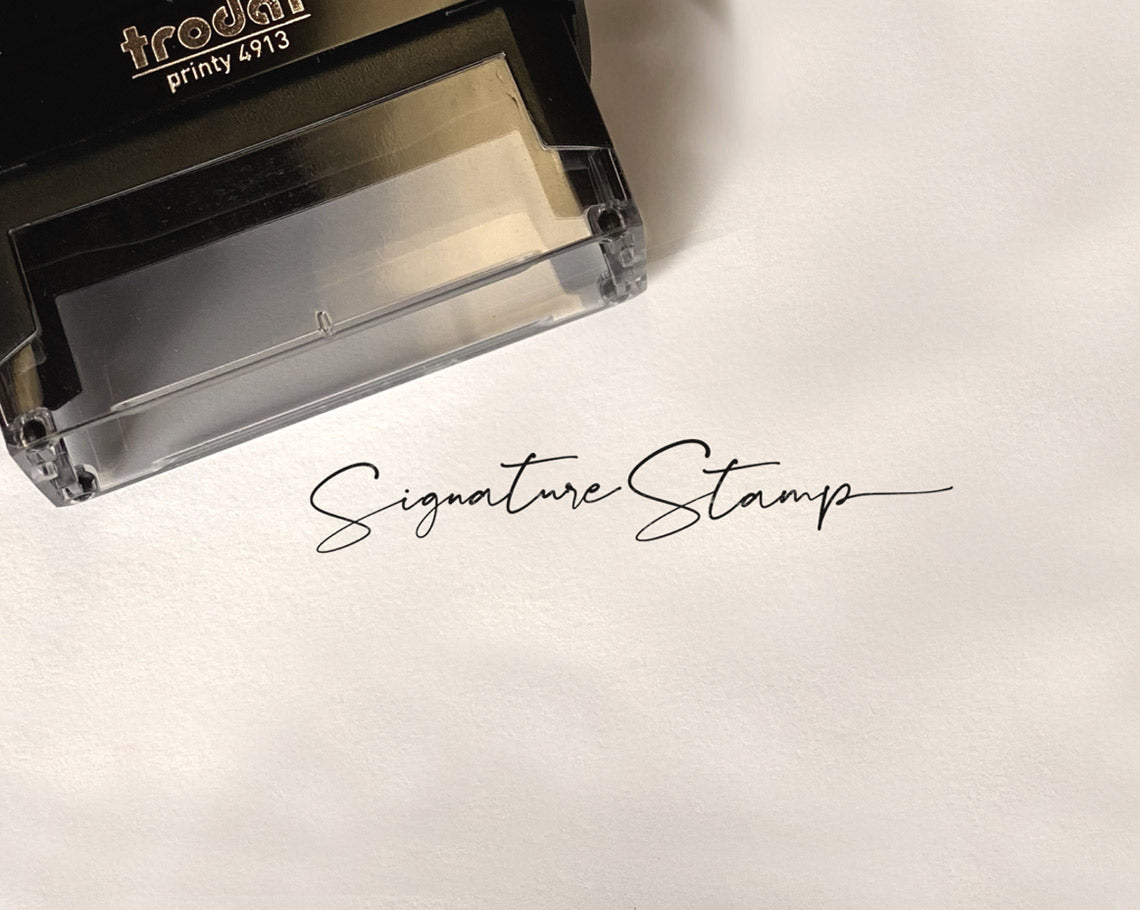When 87-year old Edna signed her last will and testament with a signature stamp rather than a pen, did she unwittingly trigger legal chaos over her estate? (scroll to the end to find out what happened)
The legality of using rubber signature stamps instead of pen and ink varies quite a bit across the United States. With signed approvals crucial for everything from real estate deals to marriage certificates and tax forms, figuring out what’s a valid signature has always posed challenges.
In this guide, we examine the paradoxes surrounding whether proxy signature stamps sufficiently meet signature requirements. On one hand, some federal and electronic commerce laws appear open to stamps representing someone’s signature if officially authorized.
But most states still require traditional “wet ink” signatures for specific important documents to prevent potential fraud before accepting stamps. Disability laws also necessitate case-by-case analysis.
We’ll explore where exactly signature stamps have legitimacy if properly reflecting the signer’s intent and where considerable limitations exist, particularly under state laws.
This article provides educational information about signature stamp restrictions and is not offering definitive guidance or legal advice. Given state variances and federal compliance requirements, consult an attorney about document-specific regulations before establishing execution validity.
Can You Use Signature Stamps on Legally Binding Documents?
The short answer is…it depends! If you're using signature stamp on critical documents like wills, real estate records, or court filings, have your signature stamp initialed by a witness or notary to verify identity and consent.

Custom Make Your Signature Stamp
The legal validity of signature stamps proves far from black-and-white across the United States. Their standing fluctuates greatly depending on nuances of jurisdiction, purposes, disabilities, and evolving precedent around required formalities in an increasingly digital world.
While there is a general recognition of their legality, particularly under certain federal laws and for ADA accommodations, state-specific regulations and requirements for certain types of documents often limit their use.
General Legal Recognition and Limitations
Signature stamps are generally recognized as legally binding when they accurately reflect the deliberate and authorized intent of the individual they represent. This principle is crucial for the legal standing of documents signed using a signature stamp, ensuring that the stamp genuinely represents the signatory’s agreement or approval.
The core legal principle underlying the use of signature stamps is their ability to reflect the deliberate and authorized intent of the individual they represent. This means that the stamp must accurately represent the signatory’s agreement or approval, ensuring the authenticity and validity of the stamped signature. This aspect is crucial for the legal standing of any document signed using a signature stamp.
Uniform Commercial Code (UCC) and Signature Stamps
The UCC, particularly Section 3-401(b), supports the legality of signatures executed by a machine or device, including signature stamps, if authorized by the individual. However, this application is primarily relevant to negotiable instruments in commercial transactions and does not universally apply to all legal documents. The interpretation and adoption of this section vary across states, limiting its applicability in certain legal contexts.
Electronic Signatures: UETA and E-SIGN Act
The Uniform Electronic Transactions Act (UETA) and the Electronic Signatures in Global and National Commerce Act (E-SIGN Act) validate the use of electronic signatures, encompassing certain types of signature stamps. However, their application is limited and does not override state requirements for handwritten signatures on specific documents.
ADA Considerations
Under the Americans with Disabilities Act (ADA), signature stamps are a legally binding accommodation for individuals with disabilities who cannot provide a handwritten signature. This provision requires individual verification and is case-specific, but it affirms the legal acceptance of signature stamps under certain conditions.
In legal practice, this principle has been upheld. A case involving a Notary brought into focus the legal definitions surrounding signature stamps. It was determined that a signature stamp applied by the person named on it is considered a lawful signature, affirming the ADA's provision for signature stamps as a necessary and legally binding accommodation for individuals with disabilities.
Federal Recognition Insufficient to Guarantee State-Level Validity
While federal laws and ADA accommodations provide a baseline degree of latitude for authorized stamp usage, this recognition shifts significantly as we transition to localized state laws and nuanced document-specific restrictions.
When analyzed on a state-level basis across various documents needing compliance, signature stamps face substantial implementation barriers relative to face-value federal acceptance.
Despite this general acceptance under federal laws and the ADA, there are significant ethical and legal considerations, especially in the judicial context.
A pertinent example is the case of 'In the Matter of Funke' (Indiana, 2001). In this instance, the Indiana Supreme Court found the use of a judge's signature stamp by court staff on protective orders, before the judge's review, to be in violation of the Code of Judicial Conduct.
This case underscores the critical importance of maintaining judicial discretion and adhering to ethical standards when using signature stamps. While these stamps can facilitate administrative tasks, they must not circumvent the necessary legal review and decision-making processes.
State-Specific Restrictions and Requirements
Despite the general acceptance under federal laws and the ADA, state-specific laws often require handwritten signatures for significant legal documents like real estate records, wills, and court documents. These laws typically mandate wet ink or handwritten signatures, limiting the use of signature stamps.
Most states consider original, handwritten signatures necessary, especially for documents requiring notarization, witnesses, or individual signatures.
Documents not legally binding on state level
Any document needing signatures to: substantiate rights, assume legal responsibilities, evidence informed consent, prove identity, reflect appropriately witnessed oaths, or transfer high-value assets tends to prohibit proxy signatures from tools like stamps.
- Real Estate Transactions and Records: Deeds, mortgages, leases, property transfer tax records and supporting documentation.
- Court Documents: Pleadings, probate filings, orders, judgments, notices and any other certified court records.
- Wills and Estate Planning Documents: Wills, codicils, trusts, intestacy filings, etc. requiring probate.
- Family Law: Adoptions, divorces, name changes, marriage licenses, and related filings.
- Powers of Attorney, Healthcare Proxies and Consent Forms: Medical advanced directives and anything conferring healthcare or legal authority.
- Government, Licensing and Election Forms: Voter ballots, vehicle registrations, articles of incorporation, professional permits, etc.
- Transactions Requiring Notarization/Witnesses: Loans, deeds, affidavits and formal statements needing to display execution before third parties.
- Contracts: Consultancy agreements, non-circumvention agreements, services engagement forms, conditional sales contracts, etc.
- Tax Filings: Property transfer declarations, value reporting forms, income reporting documents submitted to taxation authorities.
- Securities records and transfers: IPOs, share issuances, options vesting, etc.
Allowed Documents
Very few states expressly permit signature stamps on legally binding documents. The most common carve-outs are for routine internal corporate documents not governed by statutes or regulations requiring handwritten signatures or marks.
Some states allow signature stamps on informal commercial contracts and private company agreements lacking statutory signature mandates. Exceptions also emerge in states adopting electronic signature laws, as stamp legitimacy can be argued for e-signed records.
Additionally, people with eligible disabilities may be accommodated to use customized signature stamps when inability to sign or write is professionally verified. But restrictions still apply depending on the document type.
IRS Guidelines for Signature Stamp
The IRS generally prohibits the use of rubber signature stamps on tax returns to ensure the authenticity and accuracy of documents. A memorandum from the IRS's Office of Chief Counsel emphasizes this by stating that tax preparers are required to manually sign tax returns and refund claims.
However, exception exists for non-resident alien taxpayers and fiduciary return preparers, who may use facsimile signatures accompanied by a manually signed letter under penalties of perjury.
IRS Exceptions for Signature Stamp Use
Corporate officers or authorized agents are permitted to use rubber signature stamps on forms like the Form 94X series, Form 1042, Form 8027, Form CT-1, and their variants. When doing so, they must adhere to strict guidelines, including ensuring the correct application of the stamp on returns and maintaining a letter, under penalties of perjury, that confirms the facsimile signature is their adopted signature.
This letter, listing each return by name and number, must be kept for at least four years after the due date of the tax or the date of payment.
When Will Wet Ink Dry? The Winding Road Toward Signature Stamp Acceptance

Update on Edna: When 87-year old Edna’s estate entered probate, courts sided with her signature stamp’s legitimacy on what became her last will and testament. Despite initial family objections over formalities, judges upheld intent as paramount. Note: Edna's story is inspired by a true court case Phillips v. Najar, 901 S.W.2d 561 (Tex. App.–El Paso 1995).
As we have explored, signature stamps dwell in reasonable yet precarious legal territory across the United States. Courts increasingly consider the signer's demonstrated intent and authorization valid grounds for stamps when technology enables efficiency - especially for those unable to hand sign names.
Yet state legislatures cling to traditional demands for original signatures on vital documents. Lawmakers fear opening floodgates to forged fraud by relinquishing such formality requirements. And so the tireless tension between accommodation and apprehension persists when assessing proxy signature methods like stamps replacing ink on paper. Strict barriers remain standing across extensive legal domains.
Custom self-inking signature stamps make signing faster without the hand cramps and messy ink of old-fashioned pens.
Design Self-Inking Signature Stamps
While signature stamps can accurately show intent if made properly, they still lack full legal legitimacy today. People using stamps should understand the difference between situations where stamps are accepted versus those where they lead to invalidity.
Even if an argument exists to justify signature stamp usage for legal documents, the truth is state laws can still block them for real estate documents, medical consent forms, court filings and other important transactions. These types of sensitive paperwork need a complete original signature in ink from the person involved - it's a longstanding rule.
For the Ednas of the world, justice may occasionally pardon stamped signatures if doing so honors the signer’s wishes.
But society is not yet prepared to rewrite all rules that favor wet ink. Until then, signature stamps remain binding signatures quietly meeting some but not all standards for consent and identity.







